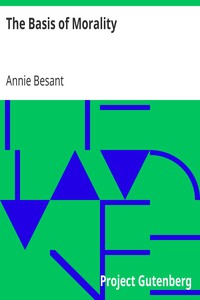The Basis of Morality by Annie Besant
"The Basis of Morality" by Annie Besant is a philosophical treatise written in the early 20th century. This work examines the foundations of ethics and moral principles, focusing on the interplay between revelation, intuition, utility, evolution, and mysticism as potential bases for morality. Besant seeks to explore how these concepts shape our understanding of right and wrong and offers insights into the moral dilemmas faced by individuals and societies. In the book,
Besant critically analyzes different proposed foundations of morality, arguing against the sufficiency of revelation due to its unprogressive nature and the fixed rules it embodies. She discusses the limitations of intuition, as variations in individual consciences can lead to conflicting moral judgments. Besant then introduces the concept of utility, suggesting that morality should be based on the greatest happiness for the greatest number, yet points out the challenges that arise from this approach. Ultimately, she advocates for an evolutionary perspective on morality, asserting that moral principles must adapt to the evolving understanding of human relations and consciousness. The work delves deep into the nuances of ethical thought, providing a comprehensive analysis of morality's basis in human experience and the natural laws of life. (This is an automatically generated summary.)
Read or download for free
| How to read | Url | Size | |||
|---|---|---|---|---|---|
| Read now! | https://www.gutenberg.org/ebooks/15545.html.images | 83 kB | |||
| EPUB3 (E-readers incl. Send-to-Kindle) | https://www.gutenberg.org/ebooks/15545.epub3.images | 98 kB | |||
| EPUB (older E-readers) | https://www.gutenberg.org/ebooks/15545.epub.images | 97 kB | |||
| Kindle | https://www.gutenberg.org/ebooks/15545.kf8.images | 196 kB | |||
| older Kindles | https://www.gutenberg.org/ebooks/15545.kindle.images | 183 kB | |||
| Plain Text UTF-8 | https://www.gutenberg.org/ebooks/15545.txt.utf-8 | 73 kB | |||
| Download HTML (zip) | https://www.gutenberg.org/cache/epub/15545/pg15545-h.zip | 94 kB | |||
| There may be more files related to this item. | |||||
Similar Books
About this eBook
| Author | Besant, Annie, 1847-1933 |
|---|---|
| Title | The Basis of Morality |
| Credits |
Produced by Jonathan Ingram, David Garcia and the Online Distributed Proofreading Team. |
| Reading Level | Reading ease score: 52.5 (10th to 12th grade). Somewhat difficult to read. |
| Language | English |
| LoC Class | BP: Philosophy, Psychology, Religion: Islam, Bahaism, Theosophy, Other and new beliefs |
| Subject | Theosophy |
| Category | Text |
| EBook-No. | 15545 |
| Release Date | Apr 4, 2005 |
| Most Recently Updated | Dec 14, 2020 |
| Copyright Status | Public domain in the USA. |
| Downloads | 290 downloads in the last 30 days. |
| Project Gutenberg eBooks are always free! | |

